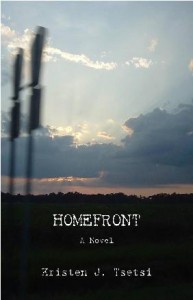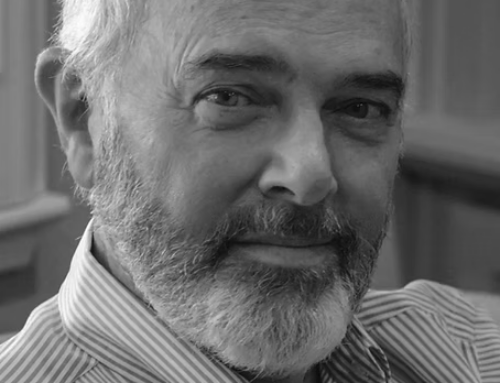
Self-Publishing Review: How did you come to self-publish? Did you try to get published traditionally?
Kristen Tsetsi: I did try the traditional route. I sent an initial series of queries, the first three of which were (to my great excitement) met with requests for first chapters. Once the first chapters were received, however, a common reaction was that there wasn’t enough obvious or immediate conflict – the war as the antagonist wasn’t what they were looking for. (I admittedly made the mistake of not properly researching the agencies before I began the query process.) I sent more queries, then, after doing some research, and I received a very positive response from an agent who told me that, as good as she thought the book was, it was “too risky” to try to sell because I was an unknown. I kept trying, but finally got impatient. I wrote the book because I thought the story was important, and because I thought it would not only be something military spouses would appreciate, but something “regular” readers would both enjoy and learn from – the longer I sat on it, the longer it wasn’t being read. So I self-published to make it available while I continued (and continue) to search for an agent.
SPR: So how would you describe your experience with self-publishing? Rewarding? Frustrating?
KT: Both. Rewarding because the end product was entirely my own: it was my cover design, my formatting, my words, my revising/editing…my everything. Also rewarding was that without the help of a professional editor or publisher, I managed to sell quite a few copies and have received only positive reader and critical reviews. Any frustration I experienced (and continue to experience) came not from self-publishing, but from the (understandable) stigma attached to self-published work. That is, it’s difficult to get reviewed by the big-time reviewers without a publisher behind you because the assumption is that if your work wasn’t picked up by a real publisher, it isn’t any good. As a result it’s equally challenging to set yourself up for interviews in desirable (read: huge) newspapers or on big-time radio shows without a NAME behind you, which makes marketing tricky. So, I went with reviewers who accept POD/self-published work and focused my attention on smaller newspapers and radio shows while thinking big and submitting to major players at the same time. Somewhere in their reject piles, Oprah, Ellen, Tyra, John Stewart, Stephen Colbert, Ollie North, and Steve Inskeep all have copies of Homefront. I did manage one big interview, though, on WNPR’s “Faith Middleton Show.” That was a surprise, and it was also a reminder that it always pays to ask. You never know who’ll say yes.
SPR: What print outlets reviewed the book that were not POD-specific?
KT: No print outlets have reviewed the book. I secured interviews/features in two small-circulation publications in Rochester, NY, and the city’s primary newspaper, the Democrat and Chronicle, included a blurb about it for their books section. To get a self-published book mentioned even in the small presses was a decent achievement, but the D&C was a nice bonus. All critical reviews, though, were online, and appeared in (or will appear in) venues that were/are more accepting of self-published work but, at the same time, are known for their knowledge and appreciation of “real” published literary fiction and writing. Storyglossia, LitKicks, The Fifteen Project (shutting down this month), PODler (which now also reviews books published by mainstream publishers), and BookPleasures supplied reviews, and reviews are forthcoming at the Emerging Writers Network (EWN) and Age 30 Books.
SPR: Is your marketing going to change now that there’s a new administration coming in? Your book was released during the Bush administration, but Obama ran on a platform against the Iraq war. Do you think that’s going to change how people read your novel?
KT: Because Homefront was intentionally written to be apolitical – or, rather, inclusive of a variety of political viewpoints – and focuses instead on the personal and intimate nature of war (the side most people don’t know about or can’t possibly empathize with because they’ve never been exposed to it), I can safely say no, the marketing won’t change. I wanted the story to be timeless with respect to the emotional and psycholocical response to having a lover deployed in any war, but I also wanted it to be timely enough to capture a particular time in history, and the awkwardness of this specific war with that specific president. There are certainly moments in the book that reveal character thoughts and feelings toward the war and the administration – some pro and some con – but whether a reader is for or against the war, or for or against the Bush administration, or for or against the incoming Obama administration, it shouldn’t color (with too much emphasis, anyway) how s/he reads and absorbs the experiences of the central character. That’s the focus of my marketing: the core feelings, the raw spectrum of thoughts and emotions – some of them not very admirable – and the absolute beauty of that much passionate negativity and positivity crashing into one another, rolling over one another and, sometimes, taking polite turns with one another.
SPR: I agree. Part of what makes your novel so effective is that it’s not slanted in any one direction: it’s not an anti-war novel and it’s not a “support our troops” novel. Your husband is stationed in Iraq. How much of this is taken from life? Have you ever driven a cab?
KT: Ian was in Iraq from early 2003 until early 2004, and in September of 2007, after 13 years in the Army, he got out. How much of the book was taken from real life…? Hm. Well, the story and events–minus the war timeline–are almost all (98%) fictional, but the emotions Mia experiences are very true to what I felt the year Ian was gone.
I did drive a cab. About six months after Ian came back, I finished my second semester as an adjunct freshman English professor at Austin Peay State University. We thought we’d be moving, so I didn’t apply to come back the next semester. Or I formally quit. I don’t really remember how that worked. Anyway, we didn’t move, and I wanted a job. I love driving and for years had thought cab driving would be fun, so I applied at Veteran’s Cab in Clarksville, TN (the name of the cab company is purely coincidental and had no bearing on why I applied). They hired me that June for the day shift, and I drove for them until December, when I quit so I could write Homefront. Twelve hours a day in a car and a shift that starts at 6 a.m. isn’t – or wasn’t, for me – conducive to writing.
Some of the people I worked with at Veteran’s Cab show up in Homefront. As does the cab stand. And my cab.
SPR: That’s great – the authenticity comes through. And there’s a Travis Bickle (“Taxi Driver”) quality to Mia. She’s not a psychopath, of course, and not just because she drives a cab, but because she’s a kind of “Underground Woman.” A lot of female writers don’t write in this way – spare, direct, while still being poetic. Joy Williams comes to mind. What writers have been a major influence?
KT: The writers whose writing I admire for different reasons and who had the strongest influence on the way I think about writing are, in no particular order, Margaret Atwood, Kate Chopin, Joyce Carol Oates, Dorothy Parker, Ernest Hemingway, John Irving, Raymond Carver, J.D. Salinger, and George Orwell. I’m sure there are more whose stories I read and whose way of doing this or that helped me figure out, over time, how I wanted to do things, but those seven are the first to come to mind.
SPR: Carver’s definitely in there. Writer comparisons can be annoying because you’ve got your own voice, but it’s a similar experience reading your book and a writer like Carver: both frustration about the lives people are leading and joy about how it’s expressed. You mentioned you dropped out of driving a cab to write. Twelve-hour shifts driving a cab to how many hours writing? What was your process?
KT: First, thank you! It’s no small thing to be compared to Carver (or any of the writers I mentioned, really), even if distantly.
I think I probably tried to write about six or seven hours a day, or produce a certain number of pages a day. I gave myself a reasonable 3-page (ss) per day limit. And I’d move around a lot when I wrote. The first third of Homefront was written in the living room. Then I had to move to the breakfast bar to feel “inspired.” Then I moved to the office. Now, as I write The Year of Dan Palace, which I started writing in my office after an hour or two of coffee and morning news shows, I find I’m writing pretty productively as soon as I wake up, so the first thing I do – even before coffee – is pull my laptop (are they called “notebooks” or “laptops”?) up on the bed.
SPR: What’s the new book’s theme – if you don’t mind revealing it at this stage. And getting back to Homefront being based on fact: is Donny based on anyone in particular? He’s such a great character – both larger than life and someone you wish would exist.
KT: The new book’s theme is essentially…well, it’s about a guy who feels the need to live his life to the fullest, but who does it at the expense of the happiness of others. There’s more to it, but I’m the worst synopsizer (which could explain at least some Homefront query rejections…).
I did know someone like Donny. I met him when I worked for a telemarketing company in 1996, and we bonded in a strange way for a short period. At the time, my new ex-husband was dating my roommate (at my suggestion – not a well conceived plan) and so the two people I was closest to (again: at the time) were suddenly a unit, with me as the outsider. It was lonely, and the real-life Donny (not his real name) was warm, and persuasive, and had so much trouble of his own that he made me forget what my issues were. He was a talker, and I wasn’t (still am not), and his pretty constant talking meant I could be quiet. He had a way of making me feel needed, because he wanted someone to listen to him, and I think I made him feel needed, too, somehow. But he could be mean, say mean things. Two minutes later, though, he’d be nothing but sweetness and irresistible charm. His depression and his drinking eventually got to be too much for someone my age (I was 22 at the time) to handle, and being around him made me feel like I was sinking into whatever darkness he couldn’t let go of, so I just stopped hanging around him. He seemed about done with me at the same time, though, and had made another friend – his own age – and had found things to do. It should be noted that our friendship, or whatever it was, was completely platonic with no hint of either of us feeling any romantic attraction. It’s probably one of the more unusual relationships I’ve had.
SPR: Nice to know real characters like Donny are out there. You’re writing from a man’s point of view? Is it in the first person? How’s it compare to writing something that comes more from direct experience?
KT: Man’s point of view, yes, but in the third person. The only reason Homefront was in first-person was because the story, I discovered after getting halfway through it in third-person, required it for intimacy. So I started over.
My parents divorced when I was two and I was raised by my father. When I was younger, the people I spent the most time with after school were boys. We rode bikes to the river, walked the trails to the castle ruins and threw rocks into the woods… I was raised, and grew up, to be pretty familiar with the way men think. Ian, who I’ve known since we were both seventeen, was writing in-depth, revealing (psychologically) letters to me at the age of 18, and continues to be pretty open about what he thinks and why. Even so, of course, I’m not a man, so there will still be mysteries, and when I come across one, I just ask Ian, or my father, what a man might do or think in a given situation. For example, yesterday I was having trouble with what Dan Palace might be thinking about the morning after an illicit sexual encounter. I didn’t want him to be thinking about the girl, but I wasn’t sure what else he might be thinking about that would be far removed from her, distant. I asked my father, who said, “Why don’t you make him have to pee?” And that was exactly the right thing.
SPR: Ha, well I’ve mentioned that there’s something a bit more masculine with how Mia’s written in Homefront, more Carver-esque. Are you going to try to go the traditional route first with the new novel, querying agents, querying small publishers, and the like?
KT: Yes. There’s nothing else I want to do, professionally. Freelance writing is okay, writing for a newspaper wasn’t bad (it was my favorite job), but unless I’m writing fiction, I feel like I’m not doing what I should be. I can’t sell books in bookstores without a publisher, can’t get a publisher without an agent, and can’t justify staying home to write unless I find a way to sell enough fiction to bring in even a little bit of money. (I make fourteen cents every time a copy of Homefront sells, but that’s not really enough…)
SPR: Understandable. I’m sure that’s the case for many self-published writers. If (only if) it doesn’t work out, will you go the same route again? At what point in the querying process do you say, enough, I’m putting it out myself?
KT: I don’t know. It’s pretty time consuming, self-publishing. And not the publishing, but the trying-to-get-it-read. I’m not a natural when it comes to marketing, so I don’t have those really great marketing ideas. So…hm. Yeah. I don’t know.
SPR: Isn’t it a case though of it’s better to have some readers than no readers at all? Even if it’s hard to sell copies, it still has the possibility of selling, of being discovered.
KT: After answering that last question, I kept thinking about it. Ultimately the answer is yes, I’d self-publish again. The only drawback is that the energy spent marketing the old means that much less energy and attention is available for the new. When writing Homefront, I was absolutely absorbed by it. And then I was obsessed with marketing, selling, and finding new ways to reach readers. I want to be equally absorbed by Palace–but marketing Homefront means I’m divided, and I can’t seem to stop marketing it. I guess I’d just prefer to not be divided. Obviously. So, my answer to you wasn’t really a “probably,” but more of a “Ughgrk, yeah, I’d self-publish again, but damn…do I have to?” It’s not the work I mind – not at all. I’ve never loved hard work so much in my life. I’d just rather spend more time thinking about my new characters than mulling over marketing.
SPR: It does take some amount of obsession whether you’re writing or marketing, and marketing might go against a writer’s normal way of being. Any last words of advice – especially for those looking to self-publish literary fiction?
KT: Last words of advice would probably be –
1. Hope to be one of those odd success stories, but don’t expect it.
2. Do expect self-publishing to be a lot of work if you want to sell the book. You’re the only publicist you have (unless you can afford to hire one)
3. Ask for reviews and blurbs and interviews from anyone you hope will provide them – even if they seem out of reach. The worst someone can do is say yes and then never get back to you. (“No,” you’ll soon figure out, is kind by comparison.) But they could always say yes, too.
4. Research the self-publishing companies before you commit. Don’t waste money. For more on this, here’s a link to an article I wrote on self-publishing. There’s also a lot of good information at SPR.
5. Before you release your book for distribution, consider finding a writers workshop, or giving your book to trusted critics, for any revision suggestions. I don’t mean friends and family – unless you can trust those people to offer thoughtful, honest, and valuable critiques.
6. Everyone says this, but it’s true: write something good. That is, don’t just write a draft and think you’re ready to publish. If you found a real publisher, your book would go to an editor and would be revised. Since a self-published author is her or his own editor (unless you can afford to pay someone), it’s on you to be the best possible editor you can be. Take it seriously.
SPR: Thanks, Kristen.
Buy Homefront on Lulu or Amazon. Check the Amazon reviews to see how this novel has affected people.
Get an Editorial Review | Get Amazon Sales & Reviews | Get Edited | Get Beta Readers | Enter the SPR Book Awards | Other Marketing Services























Great interview. Thank you so much!
Lisa May
http://lookatthatbook.blogspot.com
Years later, I remembered this was out there and stopped by to read it. And I have to make a huge correction: I say somewhere up there that everything was mine. My cover, my formatting, my editing.
The cover and formatting of this edition (now published by Missouri Breaks Press under the title Pretty Much True…) were mine, but the editing wasn’t all me. That would have been a terrible, terrible idea. Before publishing, I had submitted one chapter at a time to an online writing workshop I was part of, and a few readers, one of them particularly dedicated, offered ongoing suggestions that were utterly invaluable. I also received incredible feedback from a trusted circle of beta readers.
I didn’t intend to lie or to inflate myself with my answer. What I meant was that the manuscript wasn’t delivered to a third party who then edited it. But for sure, the editing wasn’t all mine, but was based on my own revision ideas and those offered by readers. (It took more than one of them saying “Get rid of the first three chapters” before I would finally do it. I love them for that, and for the rest of the suggestions they made, big or small.)